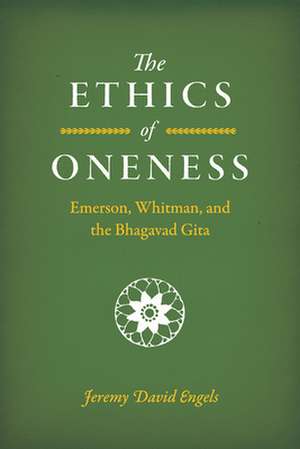The Ethics of Oneness: Emerson, Whitman, and the Bhagavad Gita
Autor Jeremy David Engelsen Limba Engleză Hardback – 18 apr 2021
In The Ethics of Oneness, Jeremy David Engels reads the Bhagavad Gita alongside the works of American thinkers Ralph Waldo Emerson and Walt Whitman. Drawing on this rich combination of traditions, Engels presents the notion that individuals are fundamentally interconnected in their shared divinity. In other words, everything is one. If the lessons of oneness are taken to heart, particularly as they were expressed and celebrated by Whitman, and the ethical challenges of oneness considered seriously, Engels thinks it is possible to counter the pervasive and problematic American ideals of hierarchy, exclusion, violence, and domination.
Preț: 674.91 lei
Preț vechi: 876.51 lei
-23% Nou
Puncte Express: 1012
Preț estimativ în valută:
129.16€ • 133.43$ • 107.49£
129.16€ • 133.43$ • 107.49£
Carte tipărită la comandă
Livrare economică 25 martie-08 aprilie
Preluare comenzi: 021 569.72.76
Specificații
ISBN-13: 9780226745978
ISBN-10: 022674597X
Pagini: 272
Dimensiuni: 152 x 229 x 20 mm
Greutate: 0.54 kg
Ediția:First Edition
Editura: University of Chicago Press
Colecția University of Chicago Press
ISBN-10: 022674597X
Pagini: 272
Dimensiuni: 152 x 229 x 20 mm
Greutate: 0.54 kg
Ediția:First Edition
Editura: University of Chicago Press
Colecția University of Chicago Press
Notă biografică
Jeremy David Engels is professor of communication arts and sciences and the Barry Director of the Honors Program in the College of the Liberal Arts at Pennsylvania State University. In 2011, Engels received the Karl R. Wallace Memorial Award, given by the National Communication Association. He is the author of many books, including The Art of Gratitude.
Recenzii
“I learned something new and exciting on virtually every page of The Ethics of Oneness. Engels doesn’t just reveal and analyze the India-Emerson-Whitman connections, he situates them where they matter the most: in everyday life at a time when the revelation of Oneness is desperately needed. At a time when diversity is celebrated by some and weaponized by others, apprehending the Unity within and beyond that diversity is an essential task for humanity. By demonstrating that Oneness is as American as it is Eastern—and profoundly democratic at that—this book makes a contribution more valuable than the currency on which E pluribus unum is engraved.”
"The appeal to ‘oneness’ is regularly and dangerously mistaken for an appeal to absolute order, to strict unity, to lockstep cohesion. The Ethics of Oneness disabuses us of this confusion. Engels shows his readers how nineteenth-century-American thinkers responded to the fracturing of their political world and the tearing of the country’s social fabric by developing a philosophy of oneness—fluid, transcendent, and spiritual—that stood against the forces of exclusion and domination which jeopardized modern life. This is a philosophy that is all but forgotten today, which is to say that Engels has written an essential book for our time. We stand in need of his reminder."
"There is much to love about this book, particularly the fact that it has a lot to offer a number of audiences, both academic and non-academic.Its greatest contribution to academic and public discourse is its account of communication as yoga, a uniquely U.S. American form of yoga. It enriches our understanding of yoga and its history in the U.S., it enriches our understanding of Emerson’s and Whitman’s philosophies by offering a new mode of approach to them, and it develops two ethical worldviews that have remained somewhat underdeveloped.This, of course, merely scratches the surface. Overall, I think Engels's book is a masterclass in public-facing academic philosophy."
"Engels does a masterful job of showing us how these two great nineteenth-century philosophers—one a mystical poet, the other a prolific essayist—created new ways of looking at early American life from the point of view of Eastern spiritual traditions."
"The Ethics of Oneness is a fascinating book about the early reception of yoga in the United states and its significance for contemporary democratic practice. Written by a scholar of rhetoric, the book is an extended analysis of the place of the Bhagavad Gita in the ethical thought of nineteenth-century US authors Ralph Waldo Emerson and Walt Whitman. . . . I welcome Engels’s invitation to pay deeper attention to the cross-national influences coursing through the social practice of democracy in all its contexts."
